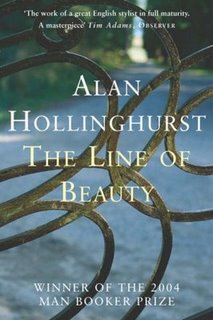Book review Tuesday: The Line of Beauty, by Alan Hollinghurst
I recently finished Alan Hollinghurt’s The Line of Beauty, winner of the 2004 Man Booker Prize for fiction. It is an excellent and intimidating book: excellent in that it’s exquisitely plotted and crafted, intimidating for the very same reasons. One of the reviewers on the back cover (Publishers Weekly) raved that it is “almost perfectly written” and “has the air of a classic.” I must agree — which is why reading this novel is simultaneously satisfying and torturous. Hollinghurst’s “almost perfect” prose is gorgeous, but it has a way of sapping all of my self-esteem about my own writing. His sentences make mine seem wilted and puerile in comparison. I mean, how can he write so well? Dammit, Hollinghurst!
I was recommended this book by one of Al’s friends from work, Jason. I was in Kramerbooks in DC, picking up way too many books to bring with me to South Africa, when I ran into Jason and we started talking about books we love. He suddenly said, “Oh my God, you have to read this book, it’s beautiful.” He then took me by the arm and led me over to a shelf, plucked down The Line of Beauty, put it in my hands, and said, “You’re buying this.”
First, some background. The book takes place between 1983 and 1986, mostly in London, at the height of Margaret Thatcher’s tenure as Prime Minister. The main character, Nick Guest, is a young Oxford graduate who is working on a graduate thesis on Henry James and is renting a room from the Feddens, a conservative political family. Gerald Fedden, the father, is a conservative Member of Parliament; Nick was friends with Gerald’s son, Toby, at Oxford, which is how Nick came to be living with them. Nick is more than just a renter, though – he fancies himself a part of the family and becomes intimately involved in the family’s workings and secrets. The book is about Nick’s fascination with the Feddens and their wealth and erudition, as well as his exploration of his own sexuality (he’s gay) and the complicated relationships he forms with several men, including a young Lebanese scion of a grocery store fortune. Soon enough, excess — drugs, sex, wealth — begin to corrupt, and the consequences are devastating for everyone.
In Kramerbooks, I flipped open the book to skim through it, as I usually do when considering whether or not to buy a book. I opened randomly to page 104, a scene in which Nick and his new boyfriend, Leo, are having an argument about where they can be alone together, but also, on a larger level, whether their relationship is going to work out at all. They had just come from visiting Leo’s ex-boyfriend, Pete.
All of Leo’s effusiveness with Pete and then with Sophie had ebbed away, and left just the two of them, in this horrible noise and crush. Nick glanced at him with a tight smile; at which Leo stretched his neck with a moody, uninvolved air. ‘Well,’ said Nick finally, ‘where do you want to go?’
‘I don’t know, boyfriend,’ Leo said.
Nick laughed ruefully, and something kept him back from a further lie. ‘A caff?’ he said. ‘Indian? A sandwich?’ — which was the most he could imagine managing.
‘Well, I need something,’ said Leo, in his tone of flat goading irony, looking at him sharply. ‘And it isn’t a sandwich.’
Nick didn’t take a risk on what this might mean. ‘Ah…’ he said. Leo turned his head and scowled at a stall of cloudy green and brown glassware, which was taking its place in their crisis, and seemed to gleam with hints of a settled domestic life. Leo said,
‘At least with old Pete we had his place, but where are me and you ever going to go?’
Could this be his only objection, the only obstacle…? ‘I know, we’re homeless,’ Nick said.
‘Homeless love,’ said Leo, shrugging and then cautiously nodding, as if weighing up a title for a song.
Isn’t that delicious? I absolutely love the line about the glassware “taking its place in their crisis.” Hollinghurst is very gifted at picking up shifts in mood between characters and exploiting dialogue, scenery, and internal thought processes of the characters to subtly bring them out. I suppose there’s a lesson in here somehow about how I can learn from Hollinghurst’s prose to improve my own, but all I can do is goggle at it. Oh, well. Some books are like that.
I recommend this novel on several levels, but don’t read it if you want to feel uplifted. Without giving much away, I’ll say that things don’t end perfectly for anyone in this novel. But the uncertainty of how things will turn out for these characters is part of what makes the book compelling.
[Oh, and one final note: they made it into a BBC series starring Dan Stevens (Matthew Crowley from Downton Abbey) as Nick! I must buy this immediately.]


1 Comment-
Pingback: Book Review Monday: eight short book reviews | Stephanie Early Green